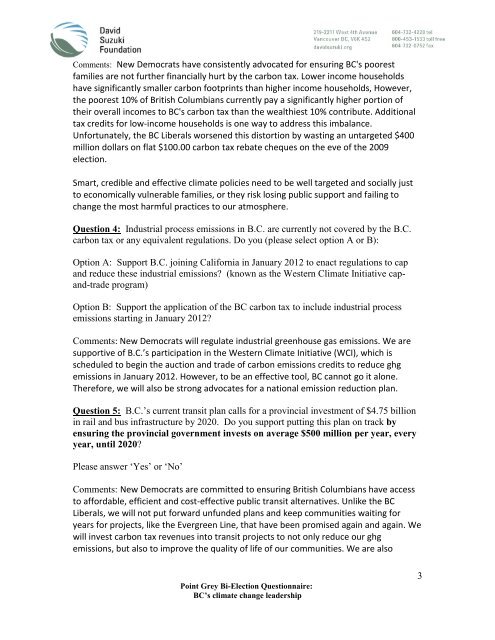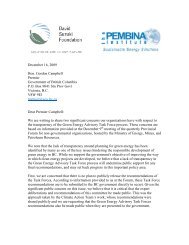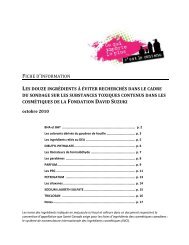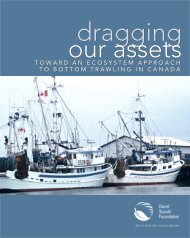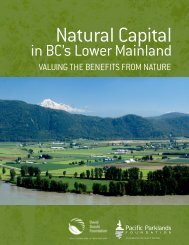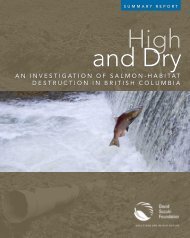Read - David Suzuki Foundation
Read - David Suzuki Foundation
Read - David Suzuki Foundation
Create successful ePaper yourself
Turn your PDF publications into a flip-book with our unique Google optimized e-Paper software.
Comments: New Democrats have consistently advocated for ensuring BC's poorestfamilies are not further financially hurt by the carbon tax. Lower income householdshave significantly smaller carbon footprints than higher income households, However,the poorest 10% of British Columbians currently pay a significantly higher portion oftheir overall incomes to BC's carbon tax than the wealthiest 10% contribute. Additionaltax credits for low-income households is one way to address this imbalance.Unfortunately, the BC Liberals worsened this distortion by wasting an untargeted $400million dollars on flat $100.00 carbon tax rebate cheques on the eve of the 2009election.Smart, credible and effective climate policies need to be well targeted and socially justto economically vulnerable families, or they risk losing public support and failing tochange the most harmful practices to our atmosphere.Question 4: Industrial process emissions in B.C. are currently not covered by the B.C.carbon tax or any equivalent regulations. Do you (please select option A or B):Option A: Support B.C. joining California in January 2012 to enact regulations to capand reduce these industrial emissions? (known as the Western Climate Initiative capand-tradeprogram)Option B: Support the application of the BC carbon tax to include industrial processemissions starting in January 2012?Comments: New Democrats will regulate industrial greenhouse gas emissions. We aresupportive of B.C.’s participation in the Western Climate Initiative (WCI), which isscheduled to begin the auction and trade of carbon emissions credits to reduce ghgemissions in January 2012. However, to be an effective tool, BC cannot go it alone.Therefore, we will also be strong advocates for a national emission reduction plan.Question 5: B.C.’s current transit plan calls for a provincial investment of $4.75 billionin rail and bus infrastructure by 2020. Do you support putting this plan on track byensuring the provincial government invests on average $500 million per year, everyyear, until 2020?Please answer ‘Yes’ or ‘No’Comments: New Democrats are committed to ensuring British Columbians have accessto affordable, efficient and cost-effective public transit alternatives. Unlike the BCLiberals, we will not put forward unfunded plans and keep communities waiting foryears for projects, like the Evergreen Line, that have been promised again and again. Wewill invest carbon tax revenues into transit projects to not only reduce our ghgemissions, but also to improve the quality of life of our communities. We are alsoPoint Grey Bi-Election Questionnaire:BC’s climate change leadership3


